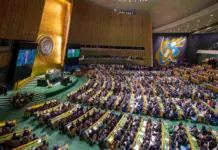The Aligarh Muslim University in India has become a target of the BJP’s extreme policies.
Muslim universities across India are experiencing the effects of Modi’s divisive propaganda. Over the past decade, Modi’s leadership has fueled sectarianism and hatred, impacting even academic institutions.
The Aligarh Muslim University, with over a century of history, has suffered from the Bharatiya Janata Party’s (BJP) sectarian politics for the past five years. During this period, several other universities with a Muslim majority have faced violence and attacks. Despite criticism of Modi’s anti-Muslim comments last week, he continued with similar rhetoric while campaigning for Aligarh MP Satish Gautam.
One PhD scholar remarked, “Aligarh University’s internal conflicts have become politicized in recent years, with the BJP’s focus on extremism rather than on employment opportunities.”
Students argue that the BJP has exploited the education system more than any other political party. Job openings are scarce, and posts for primary teachers have not been advertised in the last five years. Educated youth find it challenging to secure employment, and when job postings do occur, the BJP fills them with its own people.
“While the BJP promotes communal thinking, it neglects youth employment,” one student said.
Incidents of leaked government job exam papers in Uttar Pradesh have led to favored individuals securing positions, without much attention from the government.
Before the 2019 Lok Sabha elections, the BJP strongly objected to a picture of Quaid-e-Azam Muhammad Ali Jinnah in the student union office. In 2018, BJP supporters accused Aligarh University of promoting Taliban ideology.
The BJP also criticized the performance of funeral prayers for a Muslim student and claimed that the university was a terrorist hub after students organized a march supporting Palestine.
In 2019, students protesting against the Citizenship Bill were subjected to police violence and many were arrested. Students speaking out against the Bill have been jailed, and even mild protests during Modi’s swearing-in for his second term received heavy backlash from BJP supporters.
Protests by Aligarh Muslim University students are often met with accusations of terrorism, whereas protests at Banaras Hindu University face little criticism. This double standard raises questions about discrimination against minorities and reflects a nationwide narrative.
Student union elections have been on hold since 2018 due to pressure from RSS and BJP groups. Attacks on Muslim educational institutions, combined with funding cuts to central universities that offer affordable education, have created significant setbacks.
Since 2014, funding for Aligarh Muslim University and Jamia Millia Islamia has been reduced by 15%, while Banaras Hindu University’s budget has nearly doubled from Rs669.51 crore to Rs1,303.01 crore.
These attacks on educational institutions are part of the BJP’s Hindutva ideology, similar to the mindset of Atal Bihari Vajpayee and RSS. Muslim students from Jamia and AMU face suspicion, and anyone qualifying for the Union Public Service Commission risks being labeled a jihadi. Modi’s government continues to target Muslims in new ways, aggravating the challenges they face.
Under Modi’s rule, minorities, especially Muslims, face oppression, and Muslim educational institutions are under attack, reflecting the influence of Hindutva ideology in India’s politics.







